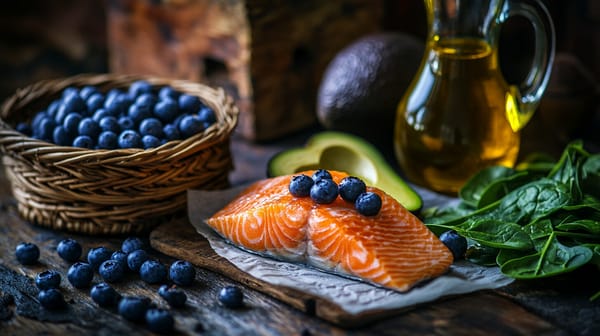Unleash the Power of Protein: Your Ultimate Guide to Optimal Nutrition

Introduction
Protein is a crucial macronutrient that plays a vital role in our bodies, from building and repairing tissues to supporting immune function and weight management. In this comprehensive guide, we'll explore the importance of protein, its impact on our health, and the best sources to include in your diet.
What is Protein and How Does it Work?
Protein is made up of amino acids, which are the building blocks of life. Our bodies use these amino acids to construct and maintain various tissues, including muscles, bones, skin, and organs. Proteins also act as enzymes, hormones, and antibodies, carrying out essential functions throughout the body.
Think of protein as the LEGOs of your body. Just as you need different LEGO blocks to build and repair structures, your body requires a variety of amino acids to function optimally. Protein helps repair damaged muscles, delivers messages between body parts, and even acts as a security guard, protecting you from harmful invaders like viruses and bacteria.
The Role of Protein in Weight Loss and Management
Protein is a powerhouse when it comes to weight loss and management. Here's how it contributes:
- Higher thermic effect: Your body burns more calories digesting protein compared to carbs and fats.
- Appetite control: Protein enhances feelings of fullness, reducing hunger cravings.
- Muscle mass preservation: Consuming adequate protein during weight loss helps maintain lean muscle mass.
- Increased energy expenditure: Breaking down protein requires more energy, boosting your metabolism.
- Blood sugar regulation: Protein has a minimal impact on blood sugar levels, preventing cravings and energy crashes.
Types of Protein: Animal-Based, Plant-Based, and Supplements
Protein comes in various forms, each with its unique benefits:
- Animal-based proteins: Meat, dairy, and eggs are complete proteins containing all essential amino acids.
- Plant-based proteins: Legumes, grains, nuts, and seeds offer a rich array of nutrients and can be combined to create complete protein profiles.
- Protein supplements: Whey, casein, and plant-based powders provide a convenient way to increase protein intake.
The best protein sources for you depend on your dietary preferences, health goals, and any allergies or intolerances. A diverse diet incorporating a variety of protein sources is generally the optimal approach for health and nutrition.
How Much Protein Should You Eat?
The recommended daily protein intake varies based on factors like age, activity level, and goals. On average, aim for 0.64-0.91 grams of protein per pound of body weight. For example, a 150-pound person should consume 95-136 grams of protein daily. Athletes and those engaging in intense exercise may require amounts towards the higher end of this range.
Maximizing Protein Intake Throughout the Day
To optimize muscle protein synthesis, spread your protein intake evenly across meals and snacks. Include protein-rich foods like lean meats, poultry, fish, eggs, dairy, legumes, and tofu in each eating occasion. If needed, protein supplements or shakes can help you meet your daily goals.
Easy Ways to Boost Your Protein Intake
Increasing your protein consumption doesn't have to be a challenge. Try these simple strategies:
- Snack on protein-packed foods like Greek yogurt, cottage cheese, or hard-boiled eggs.
- Use protein-rich substitutes such as quinoa instead of rice or whole-grain bread with seeds.
- Incorporate lean meats, legumes, tofu, or tempeh into your meals.
- Consider a protein shake for breakfast or as a snack.
- Don't forget dairy products like milk, cheese, and yogurt.
Remember, balance is key. Always consider the overall nutritional value of your food choices and aim for a varied diet.
Debunking Common Protein Myths
Let's clear up some misconceptions about protein:
Myth: All proteins are the same. Fact: Different protein sources have varying amino acid profiles and nutrient compositions.
Myth: More protein equals more muscle gain. Fact: Consuming adequate protein is important, but exceeding your requirements won't speed up muscle growth.
Myth: Plant-based proteins are inferior. Fact: Plant proteins can provide all the essential amino acids your body needs when combined strategically.
The Bottom Line
Protein is a vital component of a healthy diet, supporting weight management, muscle growth, and overall well-being. To maximize its benefits, understand its roles, choose high-quality sources, and incorporate it strategically into your meals. Remember, individual protein needs vary, so consult with a healthcare professional or registered dietitian for personalized guidance.
Embark on your protein journey today by tracking your intake with the MyFitnessPal app and discovering a world of protein-packed recipes. With the power of protein on your side, you'll be well on your way to achieving optimal health and reaching your fitness goals.




